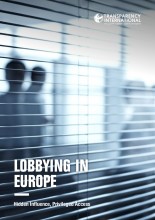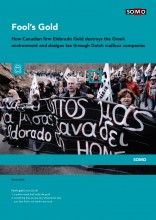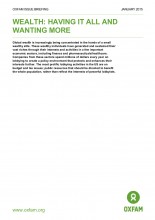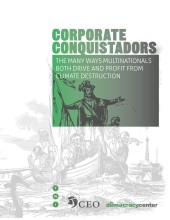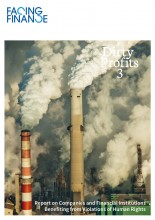“As the authors of this enlightening volume of the Watch make clear, nutritional adequacy and well-being are integral dimensions of the right to adequate food—and must be dealt with as such. Peoples’ nutrition and food sovereignty risk being undermined by predatory agri-business practices that relentlessly pursue maximum profit at all costs.”
Hilal Elver, UN Special Rapporteur on the Right to Food
The Right to Food and Nutrition Watch report "Peoples Nutrition Is Not a Business" places the spotlight on nutrition [...]
Latest on Corporate Influence and Accountability (External) - Archive
Myths and Realities
In the recently released paper 'Foreign Direct Investment, Investment Agreements and Economic Development: Myths and Realities' by South Centre, Yilmaz Akyüz examines the effects of Foreign Direct Investment (FDI) on emerging and developing economies and how it can be used to benefit them. The paper critically assesses the benefits commonly ascribed to FDI and clarifies that only a small percentage of FDI is a long term, stable, cross-border flow of capital that adds to productive capacity, helps meet balance-of-payments shortfalls [...]
In a commentary for the Business and Human Rights Resource Centre, Maina Kiai, UN Sepcial Rapporteur on the rights to freedom of peaceful assembly and of association elaborates why it is so difficult to ensure that assembly and association rights are respected in the context of natural resource exploitation, and concludes that the best solution to the problem would be a binding international treaty that imposes human rights obligations on businesses."The world has changed since the adoption of our core [...]
A new report released today, 'Policy prescriptions: the firepower of the EU pharmaceutical lobby and implications for public health' by Corporate Europe Observatory, probes the privileged access to decision-making in Brussels enjoyed by the pharmaceutical sector and facilitated by a lobby spending around €40 million, extensive meetings with policy-makers, and presence in advisory groups. The report reveals the dramatic extent of the pharmaceutical industry's lobbying efforts towards EU decision-makers, with the industry spending an estimated 15 times more than civil [...]
The prospective EU-US trade deal TTIP could be the world's biggest such treaty. While there are disagreements and divergences, in many areas of the negotiations the European Commission is singing from the corporate hymn-sheet. The revolving door between the public and private sectors is helping to grease the wheels of the TTIP corporate lobby. Some of the EU's most senior decision-makers and officials, alongside those from the member state levels, spin through the revolving door into corporate advisor roles; others [...]
Just out from the Business Sector Steering Committee is the “Financing for Development Business Compendium.” It highlights 33 efforts aimed at mobilizing the private sector capital, claiming these provide “a strong indication of the broad scope of ongoing initiatives and the potential for scaling up to achieve the demands of the Sustainable Development Goals.” The initiatives will be listed on the UN Financing for Development website as examples of the commitments different stakeholders are making under the Third International Conference [...]
Contributions to the legal building blocks of the Treaty regarding the scope, the state duty to protect and direct obligations for corporations
The first session of the Intergovernmental Working Group on an international legally binding instrument on business and human rights (IGWG) is taking place this week, 6-10 July, in Geneva. Global Policy Forum, Brot für die Welt, CIDSE, SOMO, Friends of the Earth Europe, IBFAN and IBFAN-GIFA have jointly submitted a contribution to the IGWG, which makes propositions for the legal building blocks of the Treaty on business and human rights regarding the scope, the state duty to protect and direct [...]
Politicians and executives from some of the world’s biggest agribusiness companies are meeting in Cape Town, South Africa, on June 3, 2015, for the leadership council of the controversial New Alliance for Food Security and Nutrition. On the same day, a coalition of a hundred farmers’ organisations, social movements, unions and civil society groups around the world have released a statement calling on the G7 and African governments to stop supporting the New Alliance. The policies of the New Alliance [...]
In June 2014, the UN Human Rights Council adopted Resolution 26/9 to establish an Intergovernmental Working Group (IGWG) whose mandate shall be to elaborate an international legally-binding instrument to regulate the activities of transnational corporations and other business enterprises with respect to human rights. Ahead of the upcoming first session of the IGWG on 6-10 July 2015, the Treaty Alliance, a coalition of more than 610 NGOs and 400 individuals across the globe, calls on all civil society organizations and [...]
At the sixty-eighth World Health Assembly, the currently discussed Framework of Engagement with Non-State Actors (FENSA) is one major topic of concern. Member States have not yet reached a consensus about the main subjects of debate. These are the determination of rules of engagement between WHO and non-State actors (NSAs), secondments from the private sector, and restrictions and/or ceilings on financial contributions from NSAs. While there are conflicts of interest within entities across the public and private sectors, vigilance is [...]
Published in SUNS #8025 dated 21 May 2015
Geneva, 20 May (Kanaga Raja) -- The Framework for Engagement with Non-State Actors, initiated to safeguard the independence, integrity and credibility of the World Health Organisation (WHO), now seems to bear the threat of facilitating and legitimising the corporate capture of the organisation, civil society groups have charged.
Ahead of the first meeting of the drafting group that will consider the latest draft of the framework at the current sixty-eighth World Health Assembly, some 33 civil society organisations (CSOs) and [...]
Every year, millions of euro worth of minerals flow into the EU from some of the poorest places on earth. No questions are asked about how they are extracted, or how it impacts on local communities. The EU has no legislation in place to ensure companies source their minerals responsibly. The trade in resources – such as gold, diamonds, tantalum, tin, copper and coal – continues to perpetuate a cycle of conflict and human rights abuses in many fragile areas [...]
Mapping business liability mechanisms and donor engagement with private sector in development
How can we ensure that business – in particular multinational enterprises (MNEs) – really contribute to development in the countries where they operate? The new study “Business Accountability FOR Development” by the Trade Union Development Cooperation Network (ITUC-TUDCN), supported by the CSO Partnership for Development Effectiveness (CPDE) and EURODAD, highlights existing business accountability mechanisms in general, and puts forward specific criteria to grant effectiveness of private sector initiatives in development.
Hidden Influence, Privileged Access
A new report by Transparency International finds that of 19 European countries assessed, only 7 have some form of dedicated lobbying law or regulation, allowing for nearly unfettered influence of business interests on the daily lives of Europeans. The 19 countries together score just 31 per cent (out of 100 per cent) when measured against international lobbying standards and best practice in the report “Lobbying in Europe: Hidden Influence, Privileged Access”.
Tax structure allowed McDonald’s to divert revenue for years, costing European countries over €1 billion in lost taxes between 2009 and 2013.
A new report "Unhappy Meal: €1 Billion in Tax Avoidance on the Menu at McDonald's" by EFFAT, EPSU, SEIU and War on Want outlines in detail what the authors call tax avoidance strategies adopted by McDonald’s and their tax impact both throughout Europe and in major markets like France, Italy, Spain and the U.K. The practice, the coalition says, essentially consisted of moving the European headquarters from the UK to Switzerland as well as using intra-group royalty payments and channeling [...]
How Canadian mining company Eldorado Gold destroys the Greek environment and dodges tax through Dutch mailbox companies
A new SOMO report reveals that Greece’s economic recovery is being undermined by large-scale tax avoidance – enabled by the Netherlands. At the same time, Greece endures harsh austerity measures imposed by the European Commission, European Central Bank and IMF which are supported by the Netherlands. The report, Fool’s Gold, reveals that Canadian mining company Eldorado Gold uses mailbox companies in the Netherlands to avoid taxes in Greece. This has led to tax losses of at least € 1.7 million [...]
The new book “Food Security Governance; Empowering Communities, Regulating Corporations” by Nora McKeon explores the global food governance at a crossroads. The global food crisis from 2008 affirmed that the struggle over the global food system is not between farmers in the ‘Global North’ and the ‘Global South’, but an intensified struggle between two opposing pathways for food and agriculture: those upholding the dominant status quo model of industrial agriculture and those struggling for alternative models emphasizing local diversified and [...]
Global wealth is increasingly concentrated in the hands of a small wealthy elite. These wealthy individuals have generated and sustained their vast riches through their interests and activities in a few important economic sectors, including finance and insurance and pharmaceuticals and healthcare. Companies from these sectors spend millions of dollars every year on lobbying to create a policy environment that protects and enhances their interests further. The most prolific lobbying activities in the US are on budget and tax issues [...]
A new report released at COP20 by Corporate Europe Observatory, Democracy Center and Transnational Institute shows how corporations causing social and environmental destruction in the Andes and Amazon are driving climate change, whilst enjoying influential seats at the climate-negotiating table. The case studies included demonstrate how corporations from the global North operating in the extractives industry use well-honed practices of political manipulation while hiding their true nature through extravagant public relations campaigns which trumpet their disingenuous environmental credentials. The consequences [...]
How companies and financial institutions gain billions at the expense of people and the environment and shirk their responsibilities
Facing Finance in collaboration with several other organizations has launched the third edition of the "Dirty Profits" report. The report documents sample cases of serious violations of internationally established norms and standards. It investigates 25 controversial companies that in 2013 had a joint revenue of approx. €4.196 trillion and achieved net profits of €450 billion. Companies that have been selected include some that are blacklisted on investors exclusion lists, others that do not comply with international or national law, or [...]
A new study released by BankTrack, “Banking with Principles? Benchmarking banks against the UN Guiding Principles on Business and Human Rights”, assesses how banks are doing at implementing the Principles into their own operations, policies and reporting. The report checks 32 large global banks against the UN Guiding Principles on Business and Human Rights, which set out the responsibilities of businesses to respect fundamental human freedoms. The report shows that, while some progress has been made since the Principles were [...]
Open Democracy, an independent digital commons website championing human rights, has published a thought-provoking interview with Global Policy Forum Policy Adviser, Lou Pingeot, on private military and security companies. Private military and security companies (PMSCs) have become a relevant topic in international relations and in academic literature during the last decades: the case of Executive Outcomes in the 90s, the well-known actions of Blackwater in Iraq, and G4S controversial practices are good examples of this. The controversial collaboration of these [...]
The World Bank’s Doing Business Report has been criticized by a global coalition of Civil Society Organizations to contain major methodological flaws. Such shortcomings threaten to undermine not only the report’s credibility but also the World Bank’s effectiveness in achieving its goals. Experts argue that a comprehensive overhaul of the existing indicators in the report will be necessary if it is still to serve as a useful instrument to assess the contribution of business to global development. Moreover, there is [...]
Campaigners and citizens groups have been questioning why the World Bank would publish its Doing Business Report (DBR), released on 29 October, when officials have failed to fix "strong flaws" which undermine the Bank’s goals to eliminate absolute poverty and promote shared prosperity. The DBR, which ranks countries based on the "friendliness" of their business environments, has come under sharp criticism in recent years from two independent panels, one of which cited "strong flaws" in its methodology. They made a [...]
In a letter to U.S. and EU trade negotiators and finance ministers, 52 civil society groups on both sides of the Atlantic, Global Policy Forum amongst them, have come together to warn that the Transatlantic Trade and Investment Partnership (TTIP) currently under discussion could undermine new financial regulations and potentially create significant risks to the global financial system, as well as to investors and consumers. Despite the experience of the global financial crisis, leaked documents from the confidential TTIP negotiations [...]

